What Taking Care of Black Hair Looks Like in the Time of COVID-19
For Black women, hair is major. Songs have been written, documentaries have been made, and even laws continue to be enacted that impact the relationship we have with our hair. To say that it spurs worldwide conversation is an understatement.
The COVID-19 pandemic has upended and changed the way we care for our hair. Since salons and beauty supply stores remain closed in several states (though many are in the process of re-opening), Black women have had to get creative. With the help of YouTube tutorials and TikTok videos, women are learning how to execute the styles they may have previously gone to a professional for. Box braids, sew-ins, and twists have been the go-to looks for some women under lockdown, while others have chosen to accomplish the one thing that they’ve always wanted to do: go natural.
Though stay-at-home orders have inspired many Black women to try new styles, colors, and products, it has come with some challenges. Caring for natural hair on your own can be a time-consuming task. And with the recent prevalence of video calls, some feel like they have to look "presentable" on screen, which impacts the hairstyles they choose in the first place. For some, the specter of respectability politics has moved from the workplace to the home — but that is not stopping women from experimenting with new looks and embracing their full selves.
Allure spoke to eight Black women about how they’re caring for their hair during stay-at-home orders and how it has affected their relationship with their Blackness and their confidence.
Wanna Thompson
Social media engagement editor and freelance journalist, 28, @wannasworld
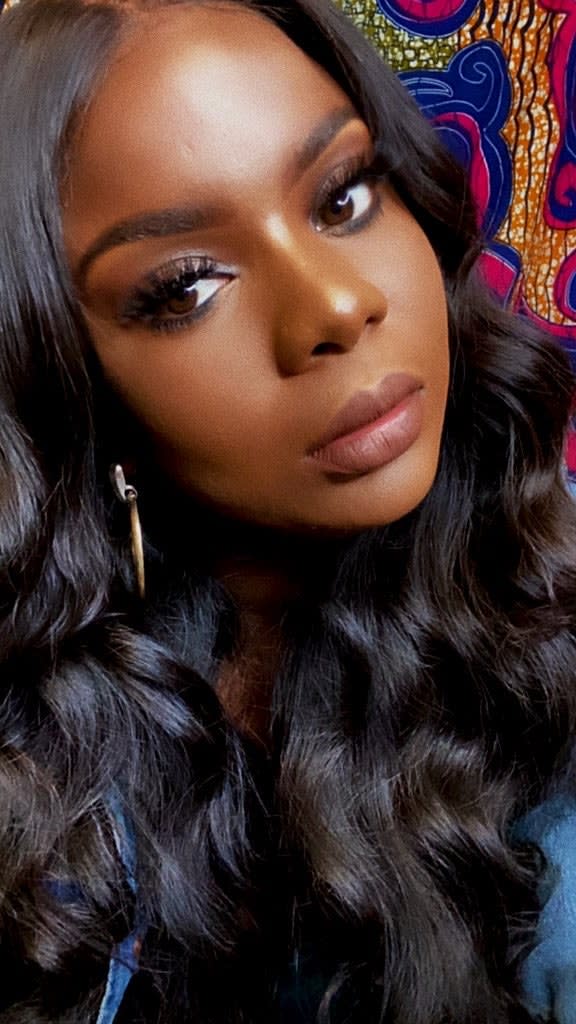
ALLURE: Before stay-at-home orders, did you get your hair done professionally? If so, how often and what was your go-to style?
WANNA THOMPSON: Before the stay-at-home orders, I rarely got my hair done professionally because I’ve learned how to do it myself. Thanks to my mom, aunties, and YouTube University, braiding, twisting, and even making my own wigs came very natural to me. As for my go-to style, I love a good curly, middle-part wig and box braids.
ALLURE: What was your relationship with your hair like pre-COVID? Did you enjoy or hate the process of doing your own hair?
WT: I’ve always had a love-hate relationship with my hair. I love my hair. I love my 4C texture, I love the thickness of it all but I hate the maintenance and the money that comes with it. I think a lot of women with 4C hair could attest to this. However, on a whim, I cut all of my hair off in May — yes all of it — in an attempt to see how healthy I can grow it again. I’m no stranger to big chops and I like the concept of starting fresh and reconnecting with my hair in a way. I feel refreshed and my spirit feels new during this difficult time. It’s almost like a weight has been lifted. So, do I still intend on wearing wigs? Yes, but the goal is to grow healthier hair in the process.
ALLURE: What has been your everyday style during the stay-at-home order?
WT: Throughout [the stay-at-home order], I’ve had numerous styles. I like to change my hair every two to three weeks. First I had a curly lace-frontal unit, next I did some locs, then I did some box braids, then I got bored and ordered a curly half-wig and.
ALLURE: Do you have to be on video calls for work/school? If so, do you feel pressure to look "presentable" on-screen?
WT: In the beginning, I had to appear on numerous Zoom calls and I never felt pressured to look "presentable." They would get whatever I present and they would have to deal, whether that be super-long box braids to my butt or a headwrap.
ALLURE: What do you most enjoy about doing your own hair? Do you feel more connected to your Blackness?
WT: I think when you do your hair yourself, you feel more empowered. Knowing that you actually took the time to learn and execute any style on your own hair makes you feel good. Especially when it comes out looking exactly like the tutorial. And in regards to feeling more connected to my Blackness, whether I have some twists in, a lace-frontal unit, or box braids, I always feel connected.
ALLURE: What’s the first style you want to get once this is over?
WT: Whew. I really can’t answer this because I want them all. But if I had to choose, I’ve been meaning to play around with more color, burgundy to be exact. Something with that hue will be my next style.
ALLURE: What have you learned about your hair during this time?
WT: Stock up on all items. Including braiding hair, grease, gel, combs, edge control, elastic bands, just about anything. The pandemic left me having to wait for egregious shipping times and I didn’t like that at all. Every Black woman should have a mini beauty supply in her linen closet.
Idara Eno
Program coordinator, 24
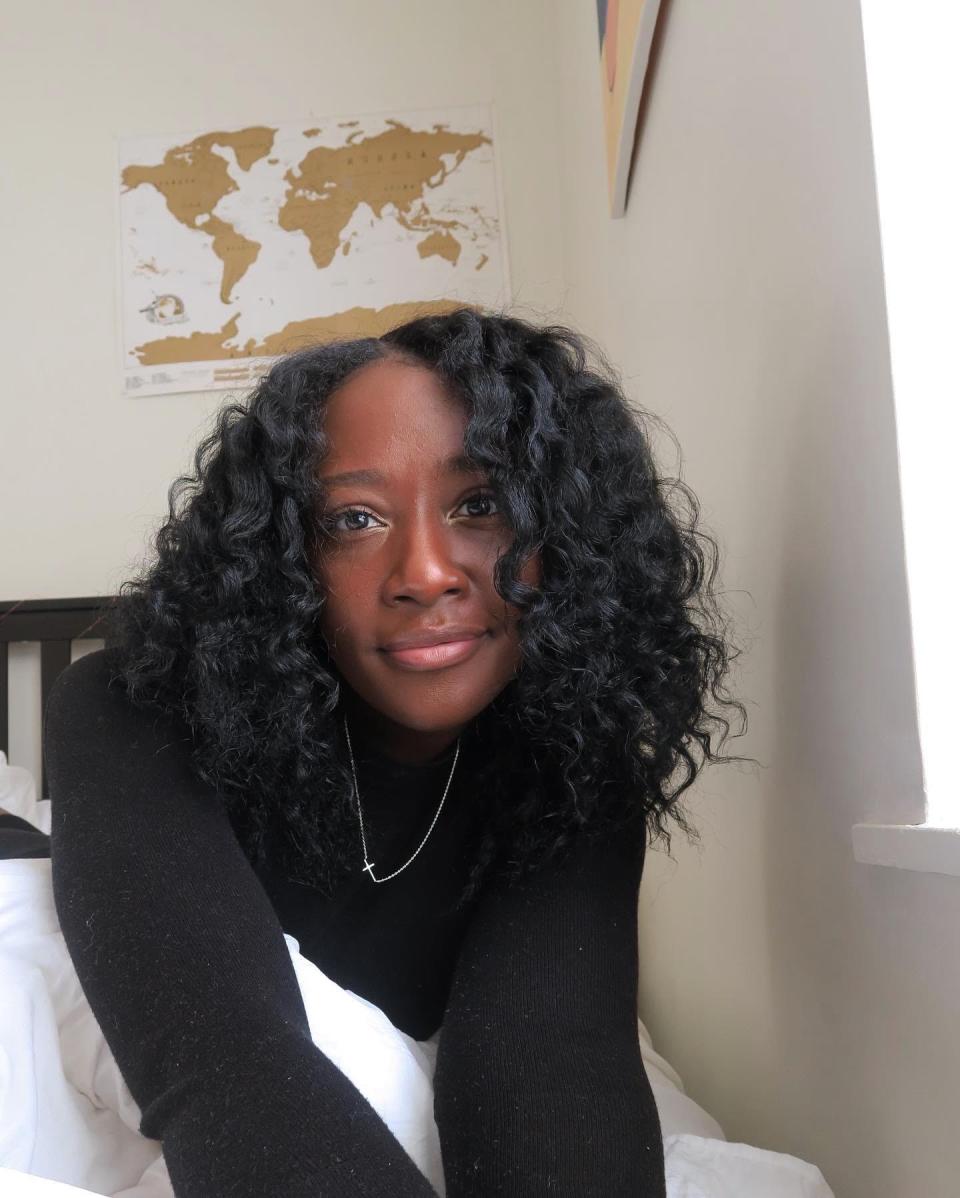
ALLURE: Before stay-at-home orders, did you get your hair done professionally? If so, how often and what was your go-to style?
IDARA ENO: Before, I did not get my hair done professionally. The last time I went to get my hair done was about two years ago, and it was Senegalese twists. Other than that, I do my own hair and on occasion, will let my sister or mom do it. I don’t really like going to get my hair done, to be honest. I’m very picky with how I like my hair done and touched, so I’ve learned to do the styles I really enjoy myself.
ALLURE: What has been your everyday style during this time?
IE: I’ve done a variety of styles. In the beginning, I did an easy protective crochet style on myself. That usually lasts about three to four weeks. I took that down and tried the long ponytail look and blew my hair out to get the sleekness. That style was fire. My twin sister was experimenting with bohemian knotless braids and it turned out to be really nice. Naturally, I had her try them on me and I loved it! Since taking those down, I’ve been stretching my hair and wearing it natural.
ALLURE: Have you experimented with different colors or styles? In the same vein, do you feel like you have more freedom to experiment since you’re at home?
IE: I have definitely experimented with color. Since being home, I feel there’s more time to experiment with ideas that would take too long before. I’ve always given myself the freedom to try things with my hair. Now, I just have more time to do styles that I wouldn’t normally have the time or energy to do.
ALLURE: Have tutorials on YouTube been helpful to you at all as you attempt styles?
IE: Um, YES! I live for YouTube tutorials and hairstyle videos. YouTube is a great outlet to learn from women who actually look like me — that is where I get a majority of my hair inspo and guidance. Without YouTube, I can guarantee you I would have never gone natural. I never knew you could have healthy, manageable hair without a relaxer until I found Naptural85. She’s the mother of natural hair on Youtube in my eyes and gave me the framework to going natural.
ALLURE: What do you most enjoy about doing your own hair? Do you feel more connected to your Blackness?
IE: There are so many positives associated with being able to do my hair myself. I get to save money, because some stylists do amazing work but can be expensive for my budget. I also get to learn about my hair that had been hidden with relaxers for a major part of my life so far. I’ve been natural now about the same amount of time I was relaxed, but I was so young and didn’t have control of my hair care. I do feel more connected to my Blackness being natural and doing my hair how I want. It’s a form of expression that allows me to display my Black Girl Magic.
ALLURE: What have you learned about your hair during this time?
IE: During this time, I’ve fallen back in love with taking time to care for my hair. When going into the office and commuting to the city every day, I get home and am usually too tired to actually give my hair TLC. Now that I’ve been working remotely, I get more moments to appreciate my hair and give it the attention it deserves.
Asia Leeds
Professor of international studies and a scholar of African diaspora studies, 38, @asialeeds
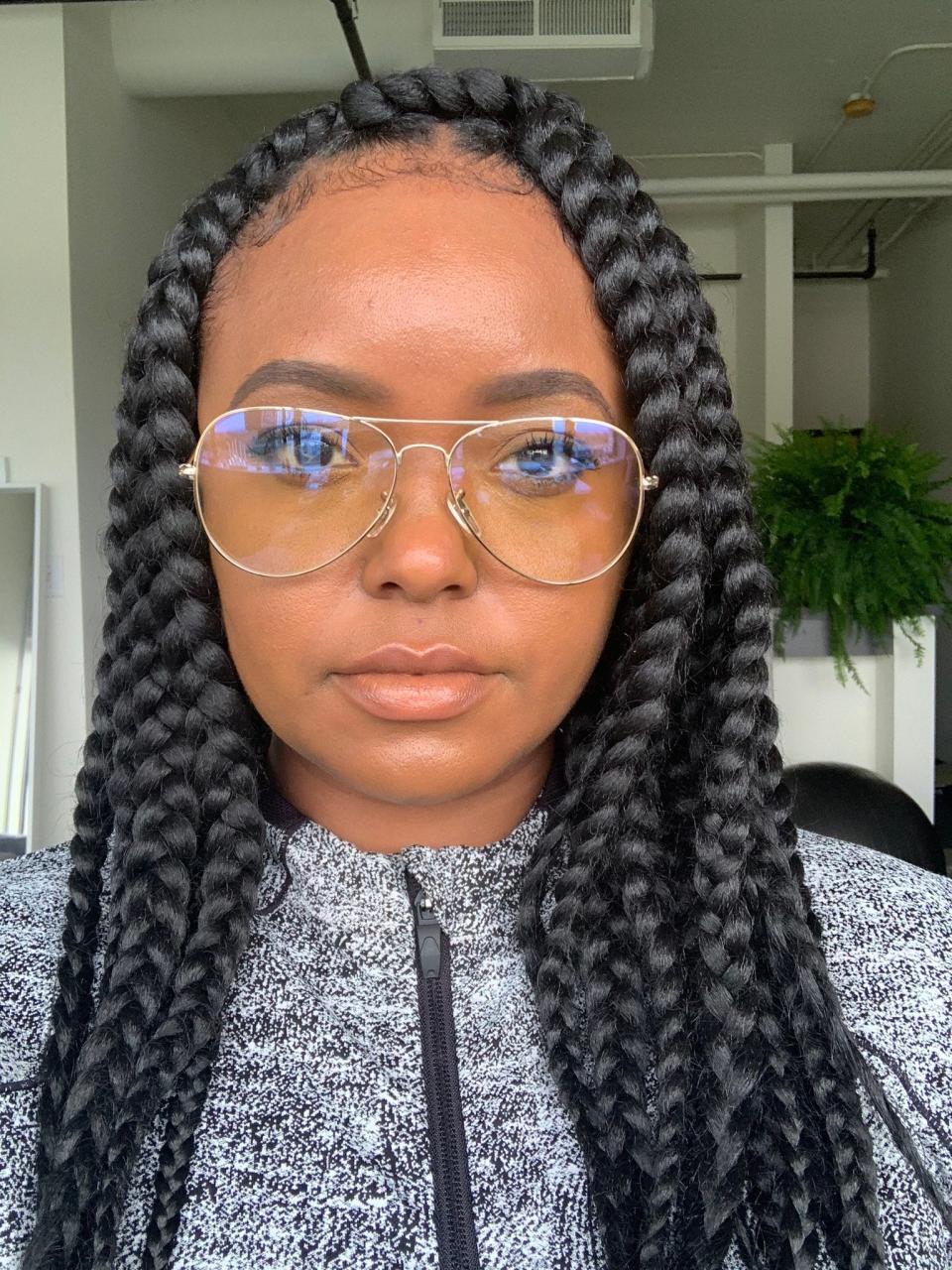
ALLURE: Before stay-at-home orders, did you get your hair done professionally? If so, how often and what was your go-to style?
ASIA LEEDS: I would get my hair done semi-regularly — maybe once every two months. My go-to styles done by professionals are sew-in weaves and braids. I did style my own hair in between, usually twist-outs, buns, and more recently, crochet braids. I enjoy caring for and styling my own hair. I started wearing my natural hair full time in 2003 while living in Costa Rica. Doing a "big chop" in Latin America as Black woman is a story in and of itself! I had to teach myself [how to care for my hair] and so I did.
ALLURE: Have tutorials on YouTube been helpful to you at all as you attempt styles?
AL: Before I did my own "quarantine" braids captured in my tweet, I did some research. I searched through YouTube videos for jumbo braids, because I figured bigger braids would take less time to do. I watched the videos (including this one) a few times to capture the technique before braiding. I have tried and failed to do my own braids and twists before so I was a little bit intimidated by it. I chose a free day with no commitments so that I would not be rushed. It took me about six hours with breaks to finish the braids. The parting was the hardest part!
ALLURE: Do you have to be on video calls for work/school? If so, do you feel pressure to look "presentable" on-screen?
AL: I do have to be on Zoom calls for work and that was part of my inspiration for braiding my hair — I wanted to look nice on camera. I show up to campus quite fashion-forward (I give looks, honey!) so although I did not dress up for Zoom classes, I still wanted my hair to look nice. I'm less experimental and more practical and protective right now with my hairstyle choices.
ALLURE: What do you most enjoy about doing your own hair? Do you feel more connected to your Blackness?
AL: Braiding my own hair does make me feel more connected to my Blackness. I feel beautiful and powerful in braids and when I am wearing them, I feel very connected to my African heritage. In normal circumstances, I get my braids done in a salon with French- and Wolof-speaking West African braiders, so I definitely miss that diasporic experience.
Ari Bines
Beauty editor, 25, @ms.bines
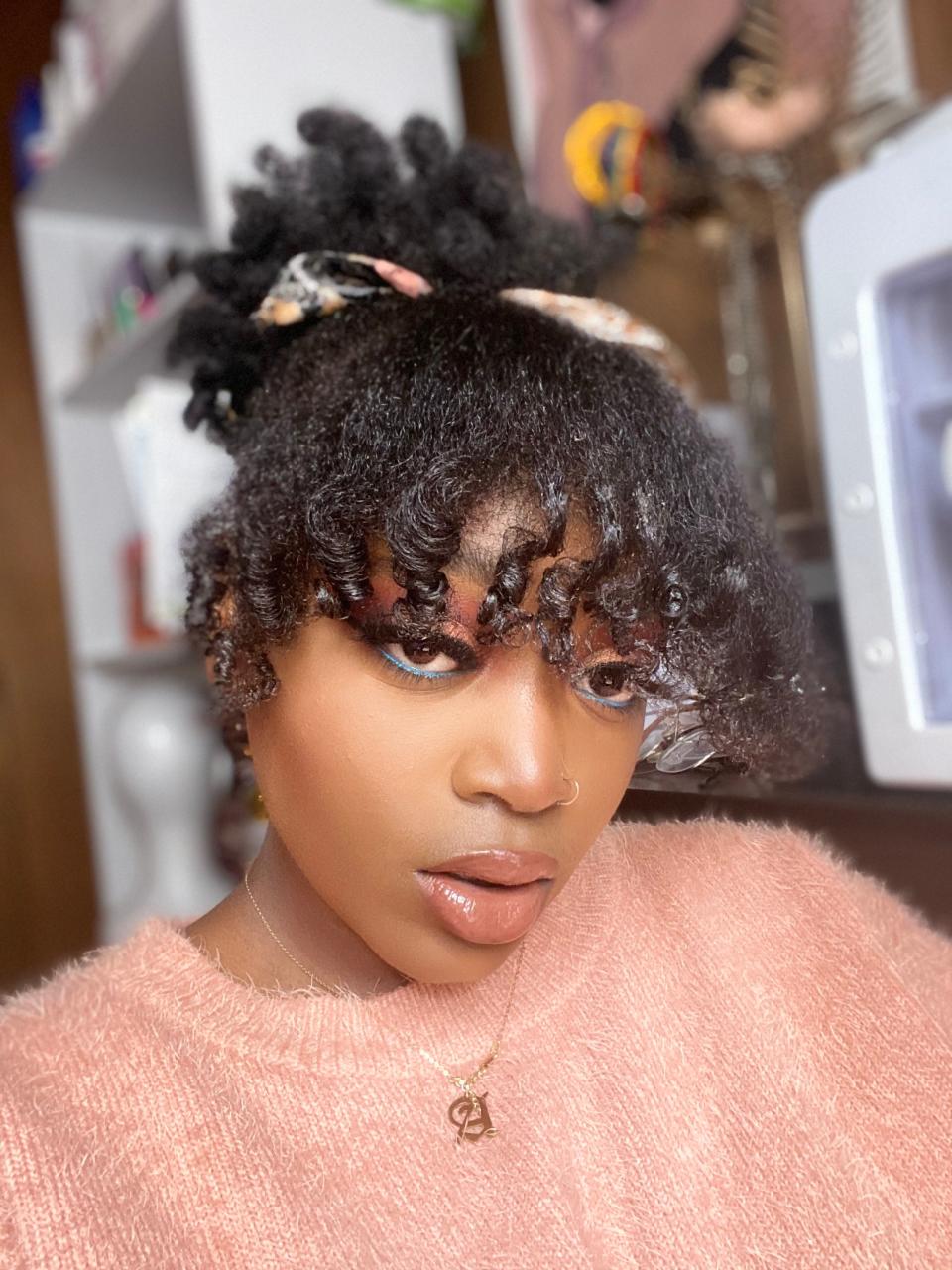
ALLURE: Before stay-at-home orders, did you get your hair done professionally? If so, how often and what was your go-to style?
ARI BINES: Right before the stay-at-home order hit in New York, I got my hair done in February professionally by this group of Black hair specialists called The Coily Collective. I’d still been on my natural hair journey before letting a pro step in and help me realize everything I was doing wrong in my hair routine. My go-to style was space buns or an Afro before that.
ALLURE: What was your relationship with your hair like pre-COVID? Did you enjoy or hate the process of doing your own hair?
AB: My relationship with my hair was experimental. I didn’t care if it was healthy or had hella split ends. I still wanted to be natural, but it was updos and "manageable" Afros. But I didn’t really hate doing my hair, it was just an extra step that I threw together without proper management.
ALLURE: Have tutorials on YouTube been helpful to you at all as you attempt styles?
AB: Some [videos] have and it’s where I discovered the magic of Mielle's pomegranate and honey collection. But most of my tips and hair tricks have come from TikTok. There’s such a wide range of quick tips for type 4 hair (although some people be lying about their texture) and it’s done wonders for my hair and confidence.
ALLURE: What do you most enjoy about doing your own hair? Do you feel more connected to your Blackness?
AB: There’s so much pride in doing your own hair. It’s work and it takes time and care, but the end result is always worth it. You get to see time and again the versatility of what it can do and the history behind every cornrow. I definitely feel more connected to my Blackness because I’ve never had to sit with this one factor of my Blackness for so long. And now that I do, it’s not something I’d ever let someone try to take from me like I’ve seen in hair discrimination.
ALLURE: What’s the first style you want to get once this is over?
AB: As a Black girl, it depends on what season it is when we get out. But if it’s [sometime in the] summer, it’ll probably be box braids.
ALLURE: What have you learned about your hair during this time?
AB: Don’t settle for discomfort in your hair-care routine. Nourish your scalp no matter what. If it feels itchy, do something about it. Nowadays, if there’s not a solution on the market, you can find one on YouTube or TikTok.
Shelli Nicole
Writer, 30, @ayoshelli
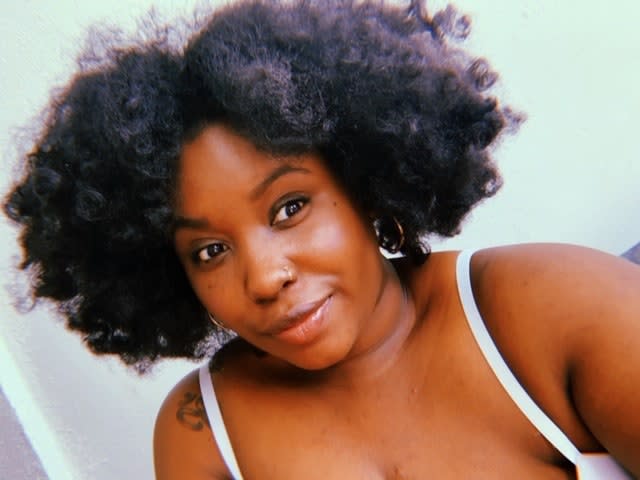
ALLURE: Before stay-at-home orders, did you get your hair done professionally? If so, how often and what was your go-to style?
SHELLI NICOLE: I used to get my hair done in protective styles every one and a half months, taking a two- to three-week break in between. My hair is natural, so I loved turning to crochet braids to help keep [it] happy and healthy. I prefer the method of braiding my hair into cornrows and crocheting the hair in — it makes me feel like I'm taking better care of my hair than with the singular crochet method. In between styles, I would take my hair out and get a natural blowout (with a wash and deep condition, of course) and work with that for two weeks. I'd use the blowout to do twist-outs and space buns once it got a few days old.
ALLURE: What’s the first style you want to get once this is over?
SN: I am so excited to get my crochets back. [I'll probably get] waist-length passion twist crochets with my [hairline] out. I should order my hair now though so I am prepared — can't wait to sit on my own hair again.
Bri Malandro
Pop culture archivist (who also works in the medical field), 30-something, @brimalandro
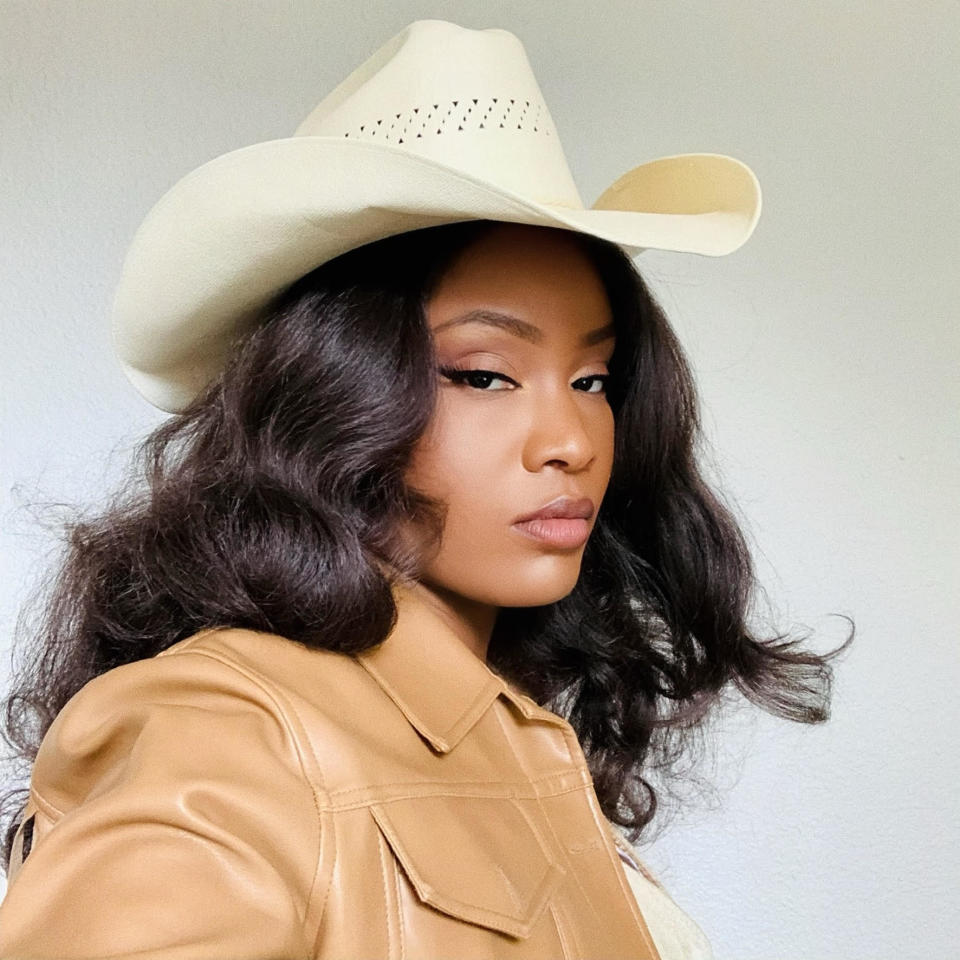
ALLURE: Before stay-at-home orders, did you get your hair done professionally? If so, how often and what was your go-to style?
BRI MALANDRO: I still haven't mastered braiding my own hair, but I did well enough to put a wig on a few weeks ago. My hair is just natural now which is cool, 'cause I just started working out. I actually might get box braids sometime in [the summer] I hate to say. The girl who does mine has been doing them for years and always did house-calls, but even those are a risk now.
ALLURE: Have you experimented with different colors or styles? In the same vein, do you feel like you have more freedom to experiment since you’re at home?
BM: When I was a dancer, my go-to color was always blonde and since then, I haven't been too afraid of color. I've experienced with others like blue, red, pink, and green over the years, but I will say to pull certain colors off in daytime/HD, you need to be almost professional yourself to lay them properly or it won't look right. I still haven't had a vibrant color laid by a professional; that's something I need to check off the list soon.
ALLURE: Do you have to be on video calls for work/school? If so, do you feel pressure to look “presentable” on-screen?
BM: They rotate remote [working] at my job so only half of the staff is there now. I come in giving what I give, I might even have my bonnet on. I don't think anyone should feel pressured given the status of the world, but it's true that you feel better when you look better.
ALLURE: What do you most enjoy about doing your own hair? Do you feel more connected to your Blackness?
BM: I've been natural since 2010 and experienced a lot of trial and error, so nothing has changed really. Like India.Arie said, "I am not my hair." Weave, natural, wig, whatever, I'm always going to be me regardless.
ALLURE: What’s the first style you want to get once this is over?
BM: Box braids or knotless braids are next, but once it's really over, I might get that colorful install.
Savannah Spicer
Entrepreneur with a focus in holistic health, 27
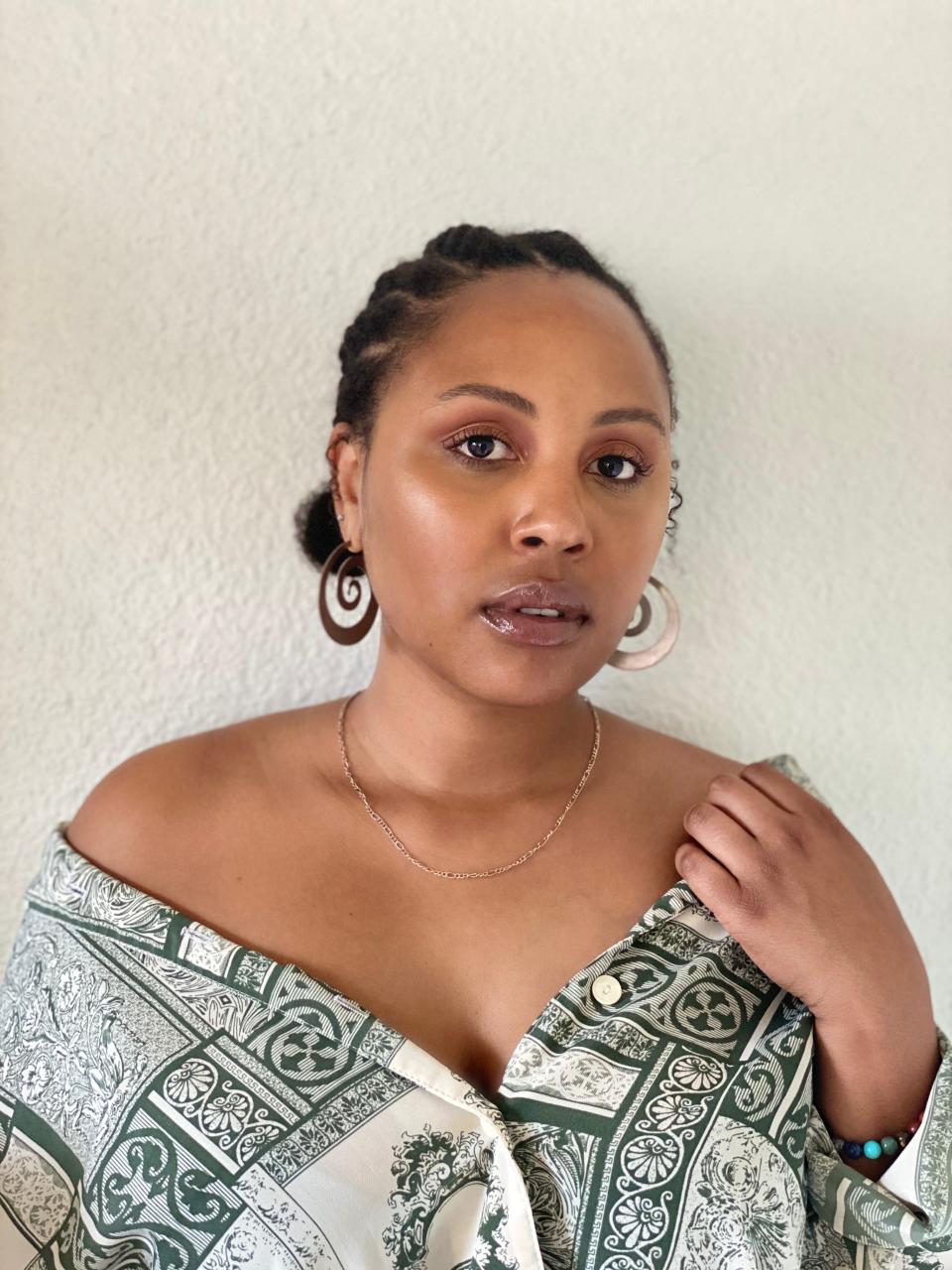
ALLURE: What was your relationship with your hair like pre-COVID? Did you enjoy or hate the process of doing your own hair?
SAVANNAH SPICER: My relationship with my hair pre-COVID was a beautiful one. I did have my moments of frustration of course, nonetheless, it’s been a positive one. I really got serious about taking care of my hair and wearing it in its natural state about five years ago or so. Over the years, I’ve noticed there is a lot that goes into getting to know your hair — what products to use, how to maintain it, etc. — and once you do that, the natural hair journey is a bit easier to go through. Had I been a new natural right before COVID-19, I can only imagine how frustrated I’d be right now… but on the bright side, there would be plenty of time for trial and error.
ALLURE: Have you experimented with different colors or styles? In the same vein, do you feel like you have more freedom to experiment since you’re at home?
SS: Yes, I definitely feel like I have more freedom to experiment with my hair right now. When I was working the typical workday, I was very hesitant to try new things with my hair since I worked for a local government. I didn’t work around many [people] that looked like me, so anytime I’d walk into the office with a new hairstyle, it was always a topic of discussion (i.e. "omg how’d you do that?" "how long did that take you?"). Now that I am working from home, I have the freedom to do whatever I want to my hair without feeling anxious about other’s remarks and looks; it’s a pretty liberating feeling.
ALLURE: What’s the first style you want to get once this is over?
SS: I’m going to be locking my hair before [isolation] is over! I’ve always thought locs were beautiful and a true expression of oneself. I've sat on this decision for quite some time now. My reasoning behind this new journey is for spiritual purposes more so than the aesthetics of locs. My loc journey will be a journey, one where I know that my relationship with God and myself will be elevated as a result. I’m excited and a bit nervous about it, but I’m sure it will be life-changing!
ALLURE: Do you have to be on video calls for work/school? If so, do you feel pressure to look "presentable" on-screen?
SS: Yes, every Monday morning I meet with two other women for our organization — UpxComing. It’s a Black millennial organization ran by three Black women (including myself). I never feel pressured to look "presentable" during our video calls because I know these women, and they look like me, so our hair and how we may look really doesn’t phase us at all. I’d say "presentable" for us is not answering the phone with a bonnet on.
ALLURE: What do you most enjoy about doing your own hair? Do you feel more connected to your Blackness?
SS: Most definitely! No one knows your hair better than you which is why I believe everyone should take the time to truly get to know their hair; paying attention to how your hair responds to certain regimens, styles, products, etc. It really all boils down to patience. While I have always been connected to my Blackness, patience with my hair (and myself) has been a key factor in elevating my Blackness.
Darian Symoné Harvin
Beauty Reporter, 29, @darian
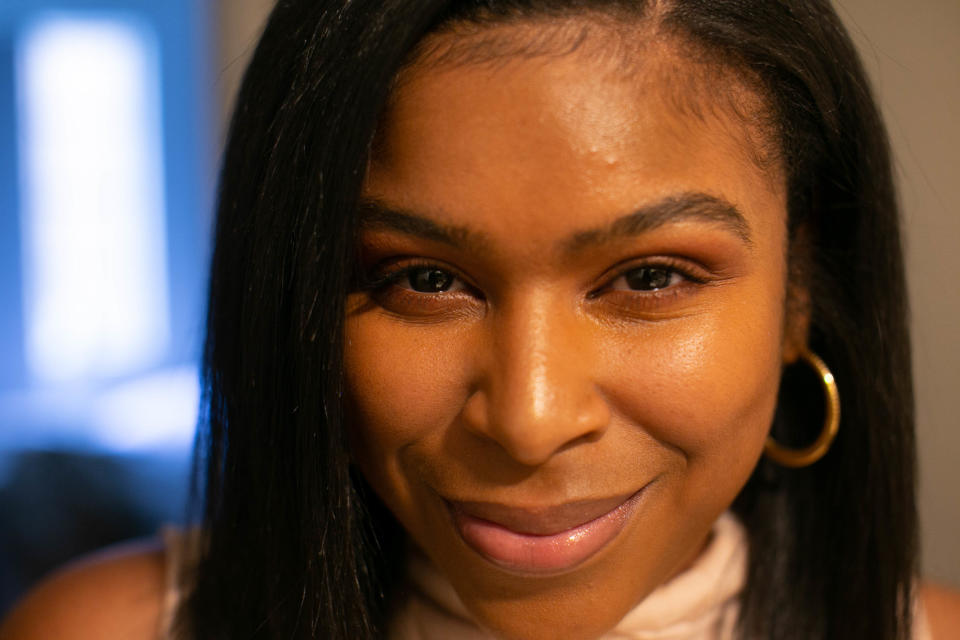
ALLURE: Before stay-at-home orders, did you get your hair done professionally? If so, how often and what was your go-to style?
DARIAN SYMONÉ HARVIN: I definitely get my hair professionally done when I’m getting braids, cornrows, or any style that I add synthetic hair to. But, growing up, my mom was a hairstylist, so I had access to a lot of tools and products — I learned how to do my own hair growing up. So if it's a blow-dry and flatiron, which is how I typically wear my hair, I will do it myself, but I'll go to a salon for trims. And I’m natural. I started transitioning when I was in college, so at this point, I don't have any more relaxer in my hair.
ALLURE: Have you experimented with different colors or styles? In the same vein, do you feel like you have more freedom to experiment since you’re at home?
DSH: I've actually been thinking more about the idea of experimenting with wigs, just because I have had some video conferences or just some things where I am showing myself more on camera. I just want to feel really confident. And I think that sometimes some of the natural styles, especially since I'm still learning, don't look as great as I want them to be on video resolution. And so I've definitely been thinking about it more.
ALLURE: Do you have to be on video calls for work/school? If so, do you feel pressure to look "presentable" on-screen?
DSH: Yeah, I definitely do. I think that there is already a lot of curiosity and lack of knowledge around our hair in workspaces that are predominantly white. And I think now that we are showing up to work in a more digital and virtual way, video resolution can affect the way that your hair comes across on screen. So I definitely feel this pressure.
But I've really been trying to break through [this thinking] that my styles need to look "neater" than what they have been in the past. But also, for example, I do this series on Instagram called “Beauty Headlines” and in my last video, I just had my individual braids. Typically, I like neat styles, but I like styles that look more laid-back and [messy] too. And I was really nervous and self-conscious about going on camera with my hair not looking "kept.” And I just said, "No, I'm going to break through that. My hair doesn't look that bad and if people have something to say, they can say it." No one said anything.
ALLURE: What’s the first style you want to get once this is over?
DSH: I think I want to get a weave. I think I want to get Lauren London's flawless partial weave installation. Oh my God, I cannot wait.
ALLURE: What have you learned about your hair during this time?
DSH: Just that this is hard. I mean, this has not been an easy process for me. I think that, just as I was making time to maintain and to style my own hair when I was out, I am still having to carve and find time to do my hair because I'm still working. And I'm also taking care of myself in new ways. So I don't feel like it's actually gotten any easier. And it still takes time. If anything, I'm still trying to find ways to save time doing my hair.
Interviews have been edited and condensed for clarity.
Check out these DIY hair styling tips:
Now, watch Skai Jackson's 10-minute makeup routine:
Originally Appeared on Allure

